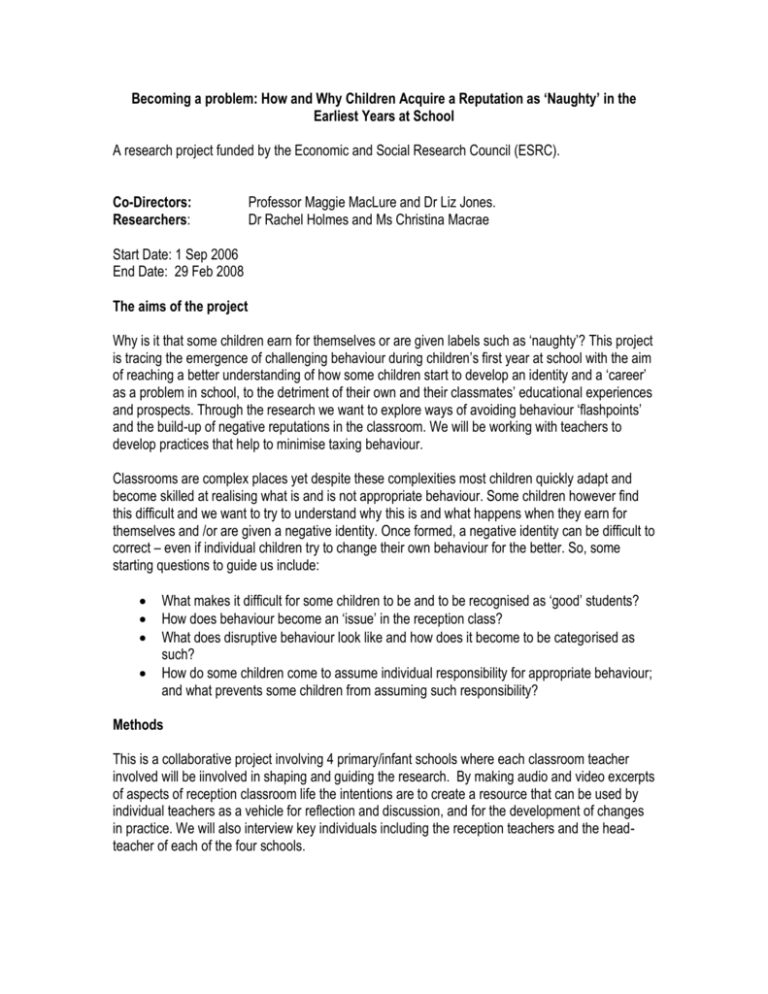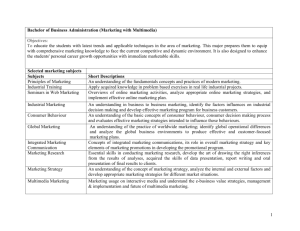Becoming a problem: How and Why Children Acquire a Reputation as
advertisement

Becoming a problem: How and Why Children Acquire a Reputation as ‘Naughty’ in the Earliest Years at School A research project funded by the Economic and Social Research Council (ESRC). Co-Directors: Researchers: Professor Maggie MacLure and Dr Liz Jones. Dr Rachel Holmes and Ms Christina Macrae Start Date: 1 Sep 2006 End Date: 29 Feb 2008 The aims of the project Why is it that some children earn for themselves or are given labels such as ‘naughty’? This project is tracing the emergence of challenging behaviour during children’s first year at school with the aim of reaching a better understanding of how some children start to develop an identity and a ‘career’ as a problem in school, to the detriment of their own and their classmates’ educational experiences and prospects. Through the research we want to explore ways of avoiding behaviour ‘flashpoints’ and the build-up of negative reputations in the classroom. We will be working with teachers to develop practices that help to minimise taxing behaviour. Classrooms are complex places yet despite these complexities most children quickly adapt and become skilled at realising what is and is not appropriate behaviour. Some children however find this difficult and we want to try to understand why this is and what happens when they earn for themselves and /or are given a negative identity. Once formed, a negative identity can be difficult to correct – even if individual children try to change their own behaviour for the better. So, some starting questions to guide us include: What makes it difficult for some children to be and to be recognised as ‘good’ students? How does behaviour become an ‘issue’ in the reception class? What does disruptive behaviour look like and how does it become to be categorised as such? How do some children come to assume individual responsibility for appropriate behaviour; and what prevents some children from assuming such responsibility? Methods This is a collaborative project involving 4 primary/infant schools where each classroom teacher involved will be iinvolved in shaping and guiding the research. By making audio and video excerpts of aspects of reception classroom life the intentions are to create a resource that can be used by individual teachers as a vehicle for reflection and discussion, and for the development of changes in practice. We will also interview key individuals including the reception teachers and the headteacher of each of the four schools. Time Line Phase 1. Main fieldwork phase (Sep 06 – Aug 07) Participant observations will be conducted over a whole school year, starting from the first week of term (1 fieldwork day per week in each classroom, over 8 weeks in each term). A whole-school meeting will be arranged in each project school in the third term, to keep staff informed of the progress of the project. An interim report will be produced at the end of Phase 1. Phase 2. Follow-up phase (Sep 07 – Feb 08) This phase will coincide with the move to new classes for the project children, and a new intake for the original teachers. Through interviews and group discussion, the project team will support the original teachers in reflecting on behaviour issues as they start to work with their new class. Meetings will also be held between the four original project teachers and the new class teachers of the project children to broaden involvement in reflection about behaviour issues, and to learn whether perceptions persist, or change, across the transition to a new situation. The team will also talk to individuals plus small groups of children. Finally a meeting between each of the participating schools will be organised so that insights might be shared. Ethical considerations Consent will be obtained from all the parents of the project children. Special care will be taken to safeguard the interests and well being of the children. Where possible we will gain the children’s consent and offer explanations in relation to the project. The University team will adhere to current best practice concerning ethical standards for social science research, including respect for adults and children, confidentiality, consent and negotiation of data. Dissemination of findings In the final two months of the project the university team and the project teachers will collaborate to produce an accessible resource for practitioners, using illustrative material from the project data and accounts of teachers’ interventions to construct mini-case studies and vignettes. This document will not aim to offer solutions or an intervention package, but will rather provide rich resources to support and inform practitioners wishing to address behaviour problems through reflective practice.







